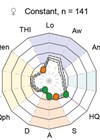Audiology features
Does diet have a role in the prevention of tinnitus?
Tinnitus, diet and healthy ageing Despite the high prevalence of tinnitus, its exact aetiology remains unclear. Research has explored the role of various biological pathways in the development of tinnitus including age-related changes in the auditory system, impaired vascular function,...
Genetic foundations of Ménière’s disease: changing the game
Sydney researchers reveal genetic roots of Ménière’s disease. Familial patterns and gene discoveries highlight autosomal inheritance in rare cases, transforming molecular insights. Ménière’s disease (MD) is a chronic disorder of the inner ear defined by clinical criteria of episodic vertigo...
Lenire as a clinical tool for treatment of tinnitus
Lenire offers a promising but varied solution for tinnitus relief. Peter Byrom shares insights on its effectiveness, challenges and patient outcomes. I have been involved in tinnitus support for at least 20 years, including a stint on the then British...
Rethinking tinnitus ‘care’: the role of digital solutions
Experiencing tinnitus can be very distressing and accessible care is limited. Digital therapeutics is one way of addressing these concerns, as described by Dr Bardy. Tinnitus presents a significant clinical challenge for various healthcare professionals, including general practitioners (GPs), ENTs...
Optimising hearing aid solutions for tinnitus sufferers: essential factors to consider
A tailored approach combining counselling, sensory management and perceptual training can improve the effectiveness of hearing aids in managing tinnitus for individual patients. Hearing aids are useful tinnitus therapy tools, according to tinnitus management guidelines. However, there are few published...
Mindfulness and tinnitus: a path to peace in the present
How does training the mind to be present in the here and now help patients with troublesome tinnitus? James Jackson discusses mindfulness and its place in tinnitus management. Although definitions can be more complex, tinnitus is the perception of sound...
Tinnitus treatment device from concept to commercialisation
Innovation in the field of healthcare is fraught with nearly insurmountable challenges. Bringing a novel product to the market requires a new (patentable) idea that can be reduced to practice, manufactured at scale, and can pass all regulatory barriers. In...
Clinical and financial success by providing specialised audiological tinnitus management
Diagnosis and management of a patient with chronic subjective tinnitus is one of the most labour-intensive areas of hearing healthcare. This is one reason some hearing care providers opt to exclude specialised tinnitus care from their practice: it may not...
Platinum-based chemotherapy, tinnitus and hearing loss
Fortunately, the five-year survival rate of adult cancers is increasing. However, we are seeing for the first time the lasting effects of cancer treatments on people. As more people live with the long-term effects of treatment, such as chemotherapy, it is imperative to understand the impact it has on quality of life.
Current perspectives of tinnitus and its management
Whilst there are various therapeutic options for ameliorating the impact of tinnitus, there is no current approved treatment for attempting to eradicate, or even for reducing, the loudness of tinnitus.
On the influence of sex on tinnitus burden and its phenotypes
One important aspect of the new paradigm in tinnitus research is to question basic assumptions. What associations does the sex of a person have with their experience of and reaction to tinnitus? Chris Cederroth raises the question and tells us...
In conversation with Professor Jos Eggermont
Having known Jos for many years, I jumped at the opportunity to catch up with him for our Nov/Dec 2020 series of tinnitus items. My questions reached him during lockdown, and he was enjoying the chance to get on top...

















